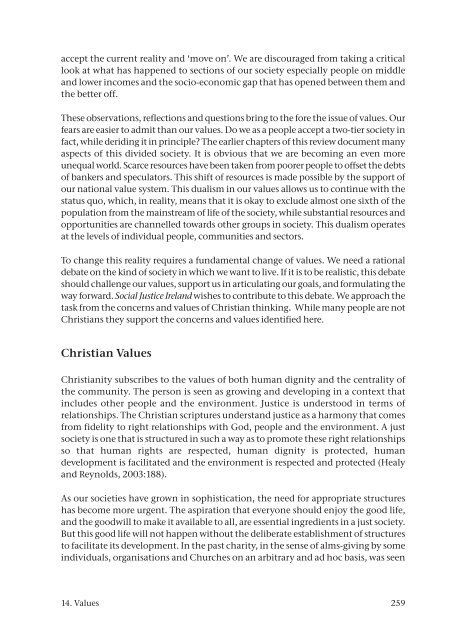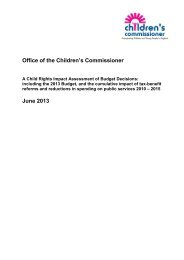2014-04-22 - Socio Economic Review 2014 - Full text and cover - FINAL
2014-04-22 - Socio Economic Review 2014 - Full text and cover - FINAL
2014-04-22 - Socio Economic Review 2014 - Full text and cover - FINAL
Create successful ePaper yourself
Turn your PDF publications into a flip-book with our unique Google optimized e-Paper software.
accept the current reality <strong>and</strong> ‘move on’. We are discouraged from taking a critical<br />
look at what has happened to sections of our society especially people on middle<br />
<strong>and</strong> lower incomes <strong>and</strong> the socio-economic gap that has opened between them <strong>and</strong><br />
the better off.<br />
These observations, reflections <strong>and</strong> questions bring to the fore the issue of values. Our<br />
fears are easier to admit than our values. Do we as a people accept a two-tier society in<br />
fact, while deriding it in principle? The earlier chapters of this review document many<br />
aspects of this divided society. It is obvious that we are becoming an even more<br />
unequal world. Scarce resources have been taken from poorer people to offset the debts<br />
of bankers <strong>and</strong> speculators. This shift of resources is made possible by the support of<br />
our national value system. This dualism in our values allows us to continue with the<br />
status quo, which, in reality, means that it is okay to exclude almost one sixth of the<br />
population from the mainstream of life of the society, while substantial resources <strong>and</strong><br />
opportunities are channelled towards other groups in society. This dualism operates<br />
at the levels of individual people, communities <strong>and</strong> sectors.<br />
To change this reality requires a fundamental change of values. We need a rational<br />
debate on the kind of society in which we want to live. If it is to be realistic, this debate<br />
should challenge our values, support us in articulating our goals, <strong>and</strong> formulating the<br />
way forward. Social Justice Irel<strong>and</strong> wishes to contribute to this debate. We approach the<br />
task from the concerns <strong>and</strong> values of Christian thinking. While many people are not<br />
Christians they support the concerns <strong>and</strong> values identified here.<br />
Christian values<br />
Christianity subscribes to the values of both human dignity <strong>and</strong> the centrality of<br />
the community. The person is seen as growing <strong>and</strong> developing in a con<strong>text</strong> that<br />
includes other people <strong>and</strong> the environment. Justice is understood in terms of<br />
relationships. The Christian scriptures underst<strong>and</strong> justice as a harmony that comes<br />
from fidelity to right relationships with God, people <strong>and</strong> the environment. A just<br />
society is one that is structured in such a way as to promote these right relationships<br />
so that human rights are respected, human dignity is protected, human<br />
development is facilitated <strong>and</strong> the environment is respected <strong>and</strong> protected (Healy<br />
<strong>and</strong> Reynolds, 2003:188).<br />
As our societies have grown in sophistication, the need for appropriate structures<br />
has become more urgent. The aspiration that everyone should enjoy the good life,<br />
<strong>and</strong> the goodwill to make it available to all, are essential ingredients in a just society.<br />
But this good life will not happen without the deliberate establishment of structures<br />
to facilitate its development. In the past charity, in the sense of alms-giving by some<br />
individuals, organisations <strong>and</strong> Churches on an arbitrary <strong>and</strong> ad hoc basis, was seen<br />
14. Values 259



